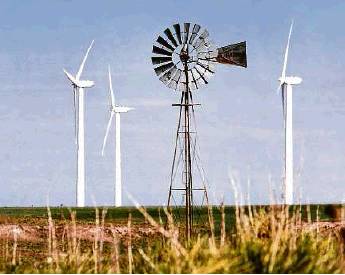Texas looks to snuff renewables’ subsidies
Fossil fuel firms press legislators as rivals gain in power market
By L.M. Sixel STAFF WRITER
Renewable energy has prospered in Texas over the years, supported by federal subsidies that have helped make the state the biggest producer of wind power in the nation and lowered electricity prices for Texas households and businesses.
But now legislators are examining ways to undermine that support and strip away what fossil fuel interests have long decried as unfair advantages for wind and solar industries. The state Senate on Wednesday passed a bill that would require state regulators to determine how to eliminate the financial advantages created by federal subsidies through measures such as new fees on renewable generators or higher rates for traditional generators — moves that would likely raise retail electricity prices.
A similar measure was approved earlier in the month by the House State Affairs Committee.
The goal of the legislation’s proponents is to slow the development of the wind and solar generation that is taking increasingly bigger shares of the Texas power market, according to Joshua Rhodes, research associate at the University of Texas at Austin’s Energy Institute. Wind energy today generates nearly 20 percent of the state’s electricity.
“Our market is designed to reward low-cost generation,” Rhodes said. “The idea is to tax wind and solar at the state level to counteract the federal subsidies.”
The legislation is another front in a broader fight launched by fossil fuel interests as wind, solar and other green technologies have become formidable competitors, slicing into the profits of traditional coal, nuclear and natural gas generators. Federal subsidies and other incentives, such as property tax breaks, that were designed to help what were once emerging technologies compete are coming under attack nationwide.
Two years ago, legislators voted to stop giving property tax abatements to wind farms within 25 miles of military airfields after concerns were raised about whether the turbines could interfere with flight paths and make the bases vulnerable to closure. This year, legislators are considering whether to stop tax abatements for all renewable projects.
Lowering prices
Oklahoma, second only to Texas in wind generating capacity, stopped state tax breaks for wind farms two years ago after a campaign backed by Harold Hamm, CEO of Continental Resources and an adviser to President Donald Trump, along with oil and gas companies. In Washington, the Trump administration has sought reductions in renewable subsidies and research funding while advocating for a bailout of coal and nuclear plants undercut by cheaper energy generated by renewables and natural gas.
In Texas, the combination of subsidies and lower production costs have made wind power cheap, helping to lower wholesale and retail power prices. At night, for example, when demand is low and winds blow strong in West Texas, so much power can flood the system that wholesale prices turn negative — that is, producers pay buyers to take the electricity.
Wind generators are able to keep producing even when prices turn negative because they can receive a federal production tax credit of 2.3 cent per kilowatt-hour over 10 years. That rankles trade group Texas Competitive Power Advocates, which represents seven power generators: NRG Energy of Houston and Princeton, N.J., Calpine of Houston, Luminant of Dallas, Talen Energy of Pennsylvania, Exelon of Chicago, Tenaska of Nebraska and Shell Oil Co., the Houston-based subsidiary of Royal Dutch Shell.
In Texas, the state’s grid manager, the Electric Reliability Council of Texas, chooses which power to buy based on cost, with new prices established every 15 minutes. The production tax credit allows wind producers to bid negatively to ensure that ERCOT takes their power, the trade group’s executive director Michele Gregg said.
The credit has also created a rush to develop projects to qualify for the credit in greater quantities than the market needs or can support, she said.
The influx of wind power has not only driven down prices and profits for her members, Gregg said, but also crowded out more reliable generation sources that can produce power when the wind isn’t blowing and the sun isn’t shining. Gregg said that creates instability in the state’s electric grid, contributing to ERCOT’s historically low reserve margin of 7.4 percent, just over half of the grid manager’s goal of 13.75 percent.
But advocates of renewable energy note that fossil fuels have received tax breaks and incentives for decades.
Since 1950, fossil fuels have collected nearly $400 billion in U.S. tax credits, tax deductions, special exemptions and allowances, including $218 billion for oil, $122 billion for natural gas and $40 billion for coal, according to a study by Washington consulting company Management Information Services for industry trade group Nuclear Energy Institute. Renewables during that same time received $84 billion in federal tax advantages.
Bills order study
In Texas, natural gas producers receive severance tax breaks, relief that was designed to help hydraulic fracturing get on its feet. That tax break is helping subsidize costs for natural gas-fueled generators whose outsized influence — natural gas generates 44 percent of the state’s power — sets the price for electricity in Texas.
Producers that can generate power cheaper than natural gas, which typically includes wind producers, benefit from the higher prices set by natural gas producers. Subsidies going to energy sources based on fossil fuels also affect pricing in the market, power experts say.
The legislative bills direct the Public Utility Commission and ERCOT to study the ways in which regulators can change the electricity market to counteract the effect of federal subsidies for renewable energy sources. The House version requires a report to the Legislature in time for its next session, in January 2021.
“We’re not opposed to a study,” said Jeff Clark, executive director of the Austin-based Advanced Power Alliance, which represents renewable power producers. “But taxpayers deserve a study that covers everything.” lynn.sixel@chron.com twitter.com/lmsixel
